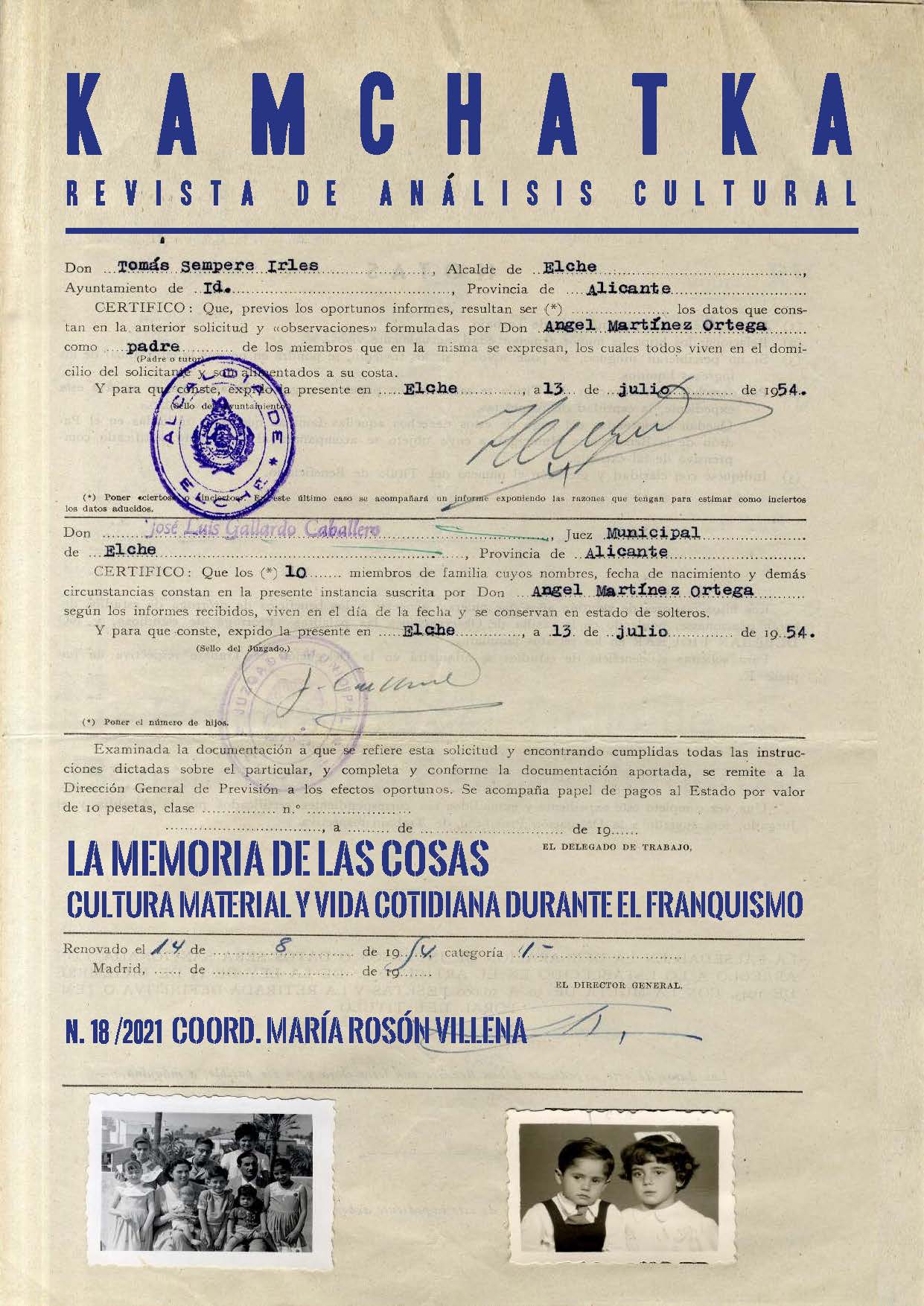“La hora de la verdad". An analysis of the 60 Minutos news broadcast, before, during and after the Malvinas War (1982))
DOI:
https://doi.org/10.7203/KAM.18.19644Keywords:
Televisión, Dictadura, Guerra Malvinas, Argentina Abstract
Abstract
The aim of this article is to analyze a number of 60 Minutos broadcasts, a program created in 1979, during the last Argentinian dictatorship (1976-1983) The main objective is to analyze the narrative and aesthetics of the program before, during and after the Argentine-British conflict over the Falklands Islands (April 2-June 14, 1982). During the conflict, the program became the most watched on Argentine television, interrupting its usual format to devote itself almost entirely to what was happening in the South Atlantic. The main hypothesis is that, during the conflict, the program does not maintain a homogeneous narrative. While until the first armed confrontations a triumphalism associated to the Christian spirit and the intrinsic virtue of the Argentine being prevails, after the official declaration of the war this narrative is transformed into the preparation of a scenario of worthy defeat that highlights the effort made by the national soldiers and the vileness of the foreign enemy. After the surrender, the program seeks to slowly return to the usual variety of subjects. The analyzed broadcasts are part of the collection of the Historical Archive of Argentine Radio and Television (TV Pública).
 Downloads
Downloads
 References
References
Anderson, Stewart y Chakars, Melissa (2016) Modernization, Nation-Building, and Television History. Nueva York: Routledge.
Borrelli, Marcelo (2008) “El diario de Massera” Historia y política editorial de Convicción. Buenos Aires: Koyatun.
Canelo, Paula (2008) El proceso en su laberinto. La interna militar de Videla a Bignone. Buenos Aires: Prometeo.
Dayan, Daniel (1992) Televisión interruptiva, entre espectáculo y comunicación, en Ferry Jean-Marc, Wolton, Dominique et al, El nuevo espacio público (pp. 58-170). Barcelona: Gedisa
Dayan, Daniel y Katz, Elihu (1995) La historia en directo. La retransmisión televisiva de los acontecimientos. Barcelona: Gustavo Gili.
Franco, Marina (2018) El final del silencio: Dictadura, sociedad y derechos humanos en la transición (Argentina, 1979-1983). Buenos Aires: Fondo de Cultura Económica.
Finchelstein, Federico (2016) Orígenes ideológicos de la “guerra sucia”. Fascismo, populismo y dictadura en la Argentina del siglo XX. Buenos Aires: Sudamericana.
Gitlin, Todd (1994) Inside Prime Time. Londres: Routledge.
Guber, Rosana (2016). Experiencia de Halcón: Ni héroes ni kamikazes: pilotos de A4B. Buenos Aires: Sudamericana.
Laclau, Ernesto (2005) La razón populista. Buenos Aires: Fondo de Cultura Económica.
Landi, Oscar (1992) Devórame otra vez: Qué hizo la televisión con la gente, qué hace la gente con la televisión. Buenos Aires: Planeta.
Lang, Kurt y Engel Lang, Gladys (1984) Television and politics. Nueva York: Sage Inc.
Nielsen, Jorge (2006) La magia de la televisión argentina 3 1971/1980. Buenos Aires: El Jilguero.
Nielsen, Jorge (2007) La magia de la televisión argentina 4 1981/1985. Buenos Aires: El Jilguero.
Novaro, Marcos y Palermo, Vicente (2013) La dictadura militar, 1976-1983: Del golpe de estado a la restauraciâon democrâatica. Buenos Aires: Paidós.
Rozitchner, León (2015) Malvinas: de la guerra sucia a la guerra limpia. El punto ciego de la crítica política. Buenos Aires: Ediciones Biblioteca Nacional.
Speranza, Graciela y Cittadini, Fernando (1996) Partes de guerra. Buenos Aires: Edhasa.
Sticotti, Joaquín (2017) De Canal 7 a ATC. Dictadura, renovación tecnológica y apuesta por la televisión comercial en Revista Brasileira de História da Mídia, Vol. 6, pp. 162-176. Disponible en: https://revistas.ufpi.br/index.php/rbhm/article/view/6064
Sticotti, Joaquín (2020) La televisión nacional, comienzo contingente de una experiencia perdurable. El proceso de estatización de los canales de Buenos Aires (1973-1974) en Nuevos Mundo, Mundos Nuevos. Disponible en: https://doi.org/10.4000/nuevomundo.79661
Verón, Eliseo (2001) El cuerpo de las imágenes. Buenos Aires: Norma.
Material audiovisual
60 Minutos, noticiero de ATC, varias ediciones entre el 2 de abril y el 21 de junio. Catálogo disponible en: https://www.archivorta.com.ar/
Downloads
Published
How to Cite
-
Abstract1398
-
Artículo PDF (Español)651
Issue
Section
License
This journal provides an immediate free access to the content on the principle that freely make investigation available to the public, which promotes an increased global knowledge exchange.
Unless otherwise indicated, texts published in this journal are under the license Attribution-NonComercial 4.0 by Creative Commons. These texts may be copied, distributed and publicly communicated whenever the publication’s author and title are quoted and whenever they are not used for commercial purposes. In any case, intellectual property of the articles and its potential economic rights entirely belong to its authors.
The full license can be consulted on https://creativecommons.org/licenses/by-nc/4.0/. We encourage authors to disseminate papers published in Kamchatka. Journal of cultural analysis electronically, in institutional digital repository or in their websites.





